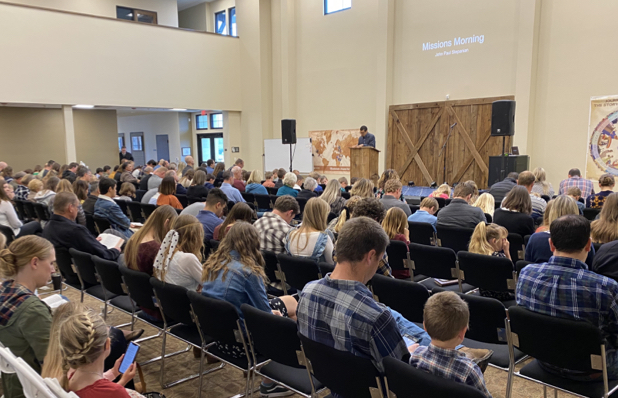Apr 25
2013
Persecution Update: Libya
Persecution Update: Libya

Sept 12, 2021
Vivamus gravida luctus feugiat. Sed sed dolor augue. Curabitur leo ex, vehicula vel orci vitae, elementum placerat nisi. Suspendisse vel urna vel neque tempus Vivamus gravida luctus feugiat. Sed sed dolor augue. Curabitur leo ex, vehicula vel orci vitae, elementum placerat nisi. Suspendisse vel urn…

Please be praying for our missionaries around the world as we support them in their Gospel work to extend the Kingdom!
Keep Reading
It is our joy to announce the newest pastor to be added to our pastoral staff, Matt Thibault. Matt and his wife, Trina, have two children, Adelyn (3) and James (2), and are expecting their third soon. The Thibault family will be moving to Kingsburg the week of March 15–20, where he will assume the role of Pastor of Discipleship at Grace Church of the Valley. They look forward to becoming part of our church family!
Keep ReadingApr 25
2013
Persecution Update: Libya
Apr 1
2013
The following quote is an excerpt from Russell Moore’s excellent book Tempted and Tried: Temptation and the Triumph of Christ (Wheaton, IL: Crossway, 2011). The ugliness of the crucifixion only magnifies the glory of the resurrection.
Mar 31
2013
Last week I wrote an overview of the importance of the recent election of Pope Francis and tried to explain the theological reasons behind the attention. I’d like to turn our attention to an evaluation of these recent events, all the while trying to remind us of both grace and truth.
Mar 18
2013
I’d like to share a pastoral word for us as a church family. Given the publicity and coverage even on the world news level, I think it’s important to ask ourselves how the Bible informs our look at the world. It certainly teaches us to be marked by grace and truth, being neither ungracious nor untruthful, a commitment I hope you’ll sense even as you read this.
Mar 4
2013
Knowing God is in my top five favorite books outside of the Bible. J. I. Packer masterfully combines a deep knowledge of God with the inescapable practical applications that knowing God should lead to. He’s scholarly and clear, deep and devotional. Knowing God will give your brain a workout and your heart passion all at the same time. Consider this section from his chapter on the wisdom of God. Packer so helpfully confronts our misconceptions about our own comfort and ease, and challenges any version of prosperity Gospel that threatens our grasp of God’s purposes.
Feb 27
2013
Last week we began considering who we are according to God. We are not our own, and we are alive even though we used to be dead. Here are a several more Gospel-informed realities that frame the core of our identity.
Feb 19
2013
“Who am I?†From Bible characters like Moses to Greek philosophers to a slew of people in “mid-life crisis,†humans have asked this question in a variety of forms. Today from the earliest ages our children are told to be true to themselves, whatever that means and assuming they have that capacity. Countless numbers of labels vie to stamp themselves on us. “I am American,†“I am poor,†“I am Republican,†“I am an addict,†“I am a mom,†“I am Hispanic,†“I am ...†Some are innocent truth, some sad truth, and many fall far short of satisfactorily answering who we truly are and are meant to be. What are some ways that the Bible tells us to think of ourselves? Because only there will we find profound, deeply accurate, and directional descriptions of ourselves that lead us to become who we are made to be.
Feb 11
2013
Have you ever had one of those intense, possibly even heated doctrinal discussions that led to a massively strained relationship with a friend? Ever had a healthy discussion with a fellow-Christian where you peacefully but forcefully disagreed on your interpretation of a passage, and in the end neither of you changed your minds? Maybe seeing a doctrinal discussion dissolve into red-faced anger, or maybe just seeing it lead to no change whatsoever, has left you feeling like doctrinal discussions are all pointless and to be avoided like the plague. And certainly some are. But as Bruce Ware reflected on a well-known story from Jesus’ life, he arrived at some helpful takeaways for us.
Feb 3
2013
The Valley of Vision is a treasure of Puritan prayers. Reading it has helped instruct me on how to pray, reminded me that God’s Word should inform the words of my prayers, and reprimanded me for praying small and weightless prayers. I highly recommend getting the book and even using it during your regular devotional times, and I think your soul will benefit from reading along with these prayers from the past. Here’s just one example, called “A Present Salvation.â€
Feb 3
2013
I haven’t sat down to write the epitaph for my gravestone, but one word I would hope to be on it would be “churchman.†Few qualities resonate as deeply with me as those that would mark a man as belonging to the church, of loving her and growing in her and giving his life for her. So any time I read of others prizing the local church I’m immediately drawn and delighted. Carl Trueman is one such modern churchman, and the following article reflects well a passion for the centrality of the local church and a prophetic call to recognize the corrosiveness in some of our American church culture.